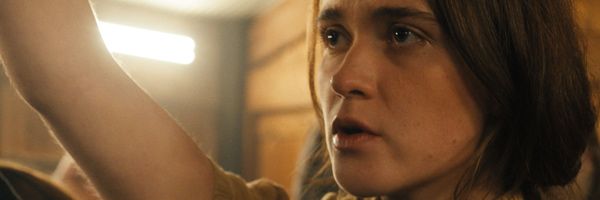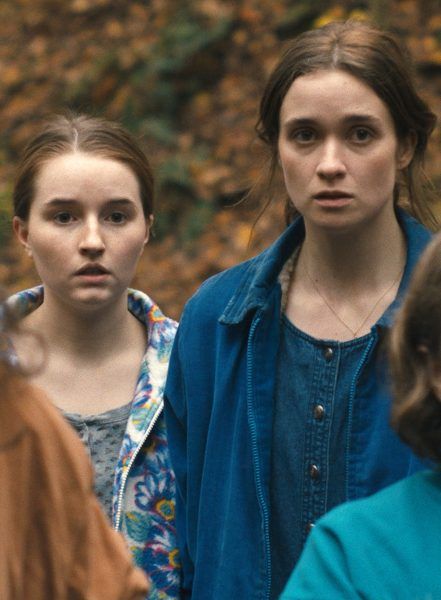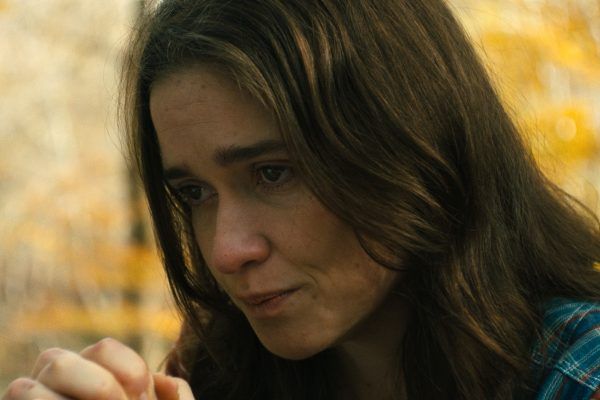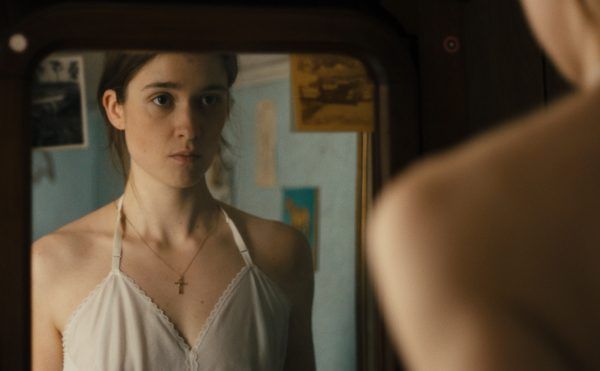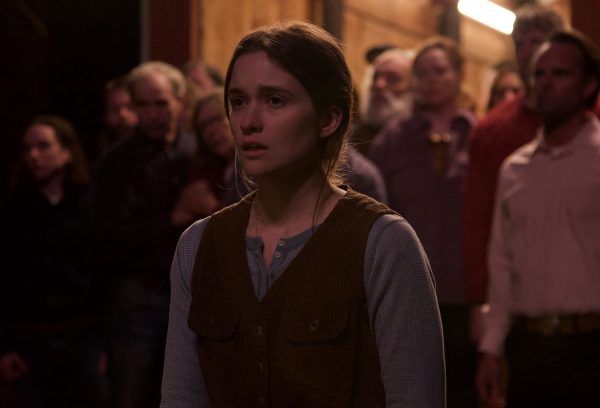From writer/directors Britt Poulton and Dan Madison Savage, the indie drama Them That Follow is set deep in Appalachia, where Pastor Lemuel Childs (Walton Goggins) presides over a Pentecostal sect of serpent handlers. At the same time, his devoted daughter, Mara (Alice Englert), is preparing for her wedding day while also being forced to confront the fact that a dangerous secret could put her directly at odds with the traditions of her family and community.
At the film’s Los Angeles press day, Collider got the opportunity to sit down and chat 1-on-1 with actress Alice Englert about why she was intrigued by this story, what she identified with in her character, figuring out how to navigate adulthood, and what fascinates her about this particular Pentecostal sect of snake handling. She also talked about her experience on the Netflix series Ratched (executive produced by Ryan Murphy), an origin story for the diabolical Nurse Ratched (Sarah Paulson) from One Flew Over the Cuckoo’s Nest.
Collider: Having seen this film, I can see the appeal of wanting to lay this character, but was it very evident on page? Were there conversations about what it would and could be?
ALICE ENGLERT: Yeah, I was definitely intrigued and interested, from the minute I read it, but it did take speaking to Britt and Dan to feel like I understood where they were wanting to take it and that they really wanted me. With Mara, there’s just so much pressure on her, in the story, and the pressure is varying, but there are so many assumptions about who she is and how she’s supposed to fulfill these roles of the good daughter, the good wife, or the perfect attraction. And there’s a lot of religious pressure on her, in that way, as well, to be pure and to be these things that would give her self-esteem. She’s pretty attached to that, at the beginning. She likes that feeling of connection and approval. Don’t we all, when you’re a teenager? It’s so exciting, when you feel okay. She’s realizes that being herself is different from the image that has kept her safe, or has been her safety, so far, and I liked that about her. We discussed that this is really someone who’s trying to do everything right, is really stubborn, really loves their dad, and is exposed to her community, but at the same time, she’s so repressed and so run by the community, as a person, that it takes being exposed within the community for her to actually be exposed to herself, and who she really is and what she’s been doing, and feeling that is at odds.
She’s such an isolated character, with no TV, no internet, and no outside influence.
ENGLERT: Yeah, I felt like we were on a spaceship, in some weird way. She’s really felt as though she was daddy’s lieutenant, but she’s slowly realizing that that’s not how anyone sees her, at all. I think her strength comes from the innocence and vagueness of childhood. Now, she’s about to be asked to play a woman and an adult person that she didn’t really expect. I’m interested in that, in general. It happens in this story, but it happens, at large, that adulthood creeps up on us. We suddenly find ourselves responsible for a world that we used to be able to poke at, and then, suddenly, you’re supposed to represent it. Sometimes that kills a rebel and a rebellious nature ‘cause you feel like now you’re part of it. But you should always be able to poke a little.
That’s why it can be so odd to assign a specific age to adulthood. How do you navigate that?
ENGLERT: I don’t know. I’m just figuring it out. All I know, so far, is that you don’t have to trust adults, if they’re not behaving in a way that’s trustworthy. You’re allowed to see it how it is. It’s so difficult because you grow up and live in an adult world where everyone who has control over you is an adult person. And then, you suddenly hit this age bracket and you’re allowed to be used by those same people that were going to protect you. That’s a little weird, but we’re gonna figure it out. You should always question what being a grown up is. I have to say hat I’m enjoying it though. I like it.
What was it about this character that you really identified with immediately, and were there things that you felt that you grew to understand or appreciate about her, the longer you lived with her?
ENGLERT: I definitely related to having a charismatic parent and feeling that inspired. I really related to how she connected to the poetry of their religion and to the responsibility of her role in it, and her role to her father, especially in the wake of losing a parent, or someone who you grow up with. I lost someone in my life, so I understood that. I also felt really close to her relationship with nature, which often lends a lot of emotion to religion because it’s such an overwhelming experience. You see it in spiritual retreats. People love to go to a field, and then, sometimes, the words that go with that feel more special and the grass under your feet feels pretty fucking great. Frankly, I also related to trying to figure it all out on your own, and then realizing that you can’t. Good job trying, with this attempt to be noble, but really you’re just mucking it up. I always felt like she was very wolfish, but like a wolf that was trying to be a dog. She’s trying to be man’s best friend, but she’s a fricking wolf. She actually still really wanted what she wanted. I liked that she thought she was going to get away with it all, or figure it out. I liked how confused she was.
People are going to think that this film must make some sort of judgment about religion, but it doesn’t really do that.
ENGLERT: No. This isn’t a cult. It’s a particular iteration of Pentecostalism that’s actually basically exclusive to the Appalachian area. But I feel like we’re all living in a cult, really, just different versions of it. Society, at large, is a cult, which is okay. Humans have always been like that. I like to feel like I can disagree, if I don’t feel right about something. If religion helps people, that’s okay, but it doesn’t work for me. I think it can be quite harsh. But with this film, I hope that people can just be at ease to feel however they feel moved to feel, from this story. The only agenda that this film has is to avoid having one, which is sometimes difficult, in itself. I hope people can feel all kinds of things, and be as mad or glad, as they want.
Did you have to come to an understanding about what this particular sect of this religion is, especially with the snakes?
ENGLERT: If any religion was gonna get me, it would be one that had snakes involved. Weirdly, that’s what made sense to me about it. Humans love extremism. They love extreme sports and thrilling activities. Snakes are such mysterious and innocent creatures, but they really provoke something in us, as people, and that it made sense to me that religion would actually want to bring that kind of mystery and provocation into what is a really hectic environment in Pentecostalism. This actual practice is not that old. I would say the verse that it draws from is in the King James version of the Bible, which is a newer one, and the Mormons use it, as well. It’s in the Gospel of Mark 16:17-18. George Hensley, who was a moonshiner in the 20th century, became a preacher, and he was reading that passage and took it very literally. It says, “And these signs shall follow them that believe,” or something like that. I can’t quite quote scripture. And one of them was, “They shall take up deadly serpents and not be harmed.” He felt that that should be taken as literally as possible, so this has only been happening for, at the most, a hundred years. I find it totally fascinating. I didn’t realize that people would think of it as weird, until we were in Sundance and were doing press, and people were asking those kinds of questions. It always made a romantic sense to me. It doesn’t seem that weird, considering all of the weird things people do already, and the lengths that religion pushes people to. I didn’t think it was that much further a step. It is dangerous, by the way. I feel like I haven’t said that. I saw a rattlesnake, but I didn’t handle one. I experienced the dread. I didn’t have time to think about how scared I was. My body was like, “No, we don’t like this, at all. Let’s get as far away as possible.” So, don’t do it. It’s really, truly dangerous, and people do die. People have died from doing it. That’s why it’s illegal, everywhere except West Virginia.
You’re also doing Ratched, aren’t you?
ENGLERT: Yes, and I’ve finished it. It was really fun!
What was the appeal of that, for you? Had you been familiar with Ryan Murphy’s work?
ENGLERT: I’m really familiar with Ryan Murphy’s stuff, and I love it. It was such a great group. I’m not really allowed to say anything about it yet because they’re so good at keeping secrets. But what I love about Ryan Murphy is that he understands what’s sexy, actually, genuinely, truly, and that is tension and humanity and story. He gets what is human and erotic and cool and weird. That was really exciting for me. It was really far away from the pastor’s daughter, is what I would say. Fuck, maybe that’s too much to say. I appreciate him because he stimulated my imagination and my heart. I love it when you watch something that actually makes you feel like you can’t look away and you don’t want to do something else while you’re there. The characters are always so much more than you could think up, so you’ve got to keep your eyes on them. I liked doing that, a lot. And his relationship with Jessica Lange has been one of the reasons I feel so excited about being an actor. Just watching the work that she’s doing, and the characters that they’re creating, is like, “Wow! What next?!” I think it’s gonna be good. I hope. I really enjoyed doing it. The cast was really, really kind.
Them That Follow is now playing in theaters.

